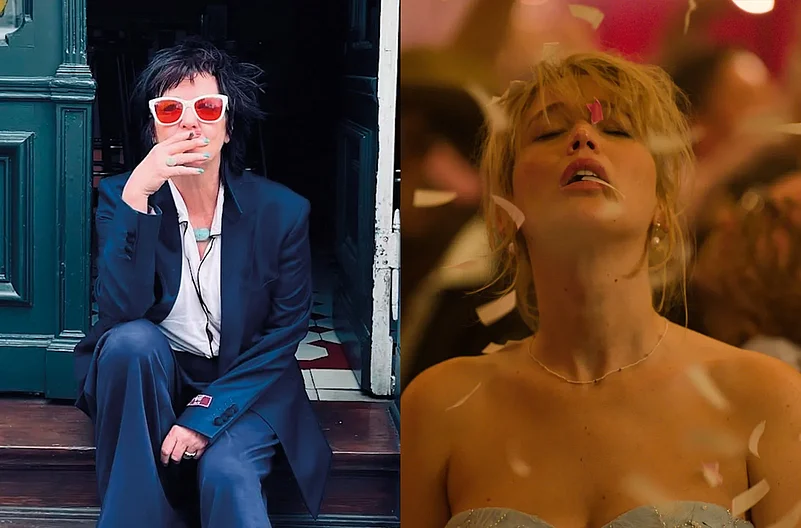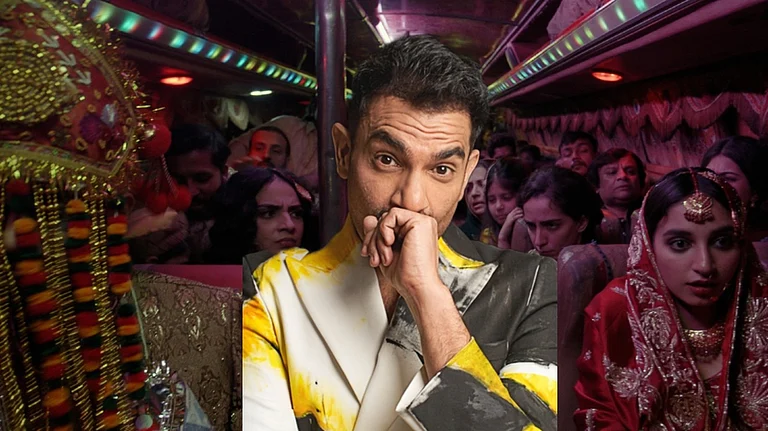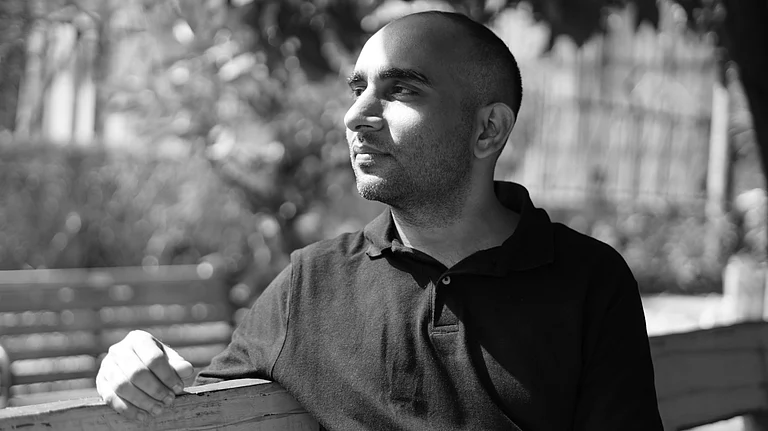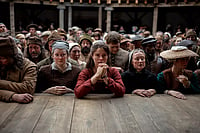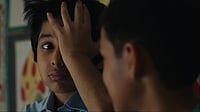
Lynne Ramsay's Die My Love premiered at this year's Cannes Film Festival
Executive produced by Martin Scorsese, it circles a young mother plummeting played by Jennifer Lawrence
In this interview, Ramsay speaks about constructing her heroine's caustic honesty, prep, leeway in filming, and more.
There’s a seismic force Jennifer Lawrence exerts in Lynne Ramsay’s long-awaited Die My Love. In a dream match between maker and star, neither performs in half-measures. The film premiered in Cannes main competition this year to mixed reviews. However, there is sheer consensus on its lead. Lawrence summons jagged, acidic ferocity as a new mother, Grace, who finds her marriage, her creative and regular life cold and dried up. But Grace’s senses rage wildly. Everything else pales next to it. Having moved with her husband, Jackson (Robert Pattinson), into an empty house in the middle of nowhere, she’s bored, vexed, disaffected, desperately hungry for more. Isolation eats into her even as she bristles. The Oscar-winning actress is inveterately primed for her fifth nomination. In Lawrence’s hands, Grace turns into a wanton beast, one you never know when it might snap and charge. The actress outruns few distractingly ham-fisted motifs and strands that don’t entirely blaze. Yet this is a shiveringly sensory experience, sudden flares edging the frames like a supernova of splintering consciousness. MUBI has acquired rights for a raft of territories, including India.
Ahead of the film’s Gala premiere at the BFI London Film Festival, Lynne Ramsay sat down with an exclusive group of journalists, including Outlook’s Debanjan Dhar. She spoke about straddling sympathy for her heroine who chafes at it, straying in filming, her hopes from audiences in how they respond to Grace’s impulses.
Edited excerpts from the conversation…
A recent Deadline piece quoted you as being miffed with all the focus on postpartum depression when it was about so much else. Why did you want to pull away from that?
It’s based on the Anna Harwicz book. It’s one aspect that happens to the character, but it’s also about the marriage disintegrating, how sex life changes with motherhood. I never like to do a 2D thing, pivoting on just one thread. Grace is a forceful character who may have spiraled before.
There’s also a creative block. Do you have a rich world to get out of an inner slump?
I like to swim. Often great ideas come up then. For Grace, the sex, the writing stops. Her life halts. She’s in isolation. These are other aspects of her that’s unravelling in this place. With a creative block, sometimes you hit a wall and have to distance yourself completely.
Jennifer Lawrence approached you, not the other way round. Did she come with certain ideas for the script or it was a blank slate?
Pretty much a clean slate. She was very trusting and just wanted to work with me. She knew how I worked and encouraged me to approach the material my own way.
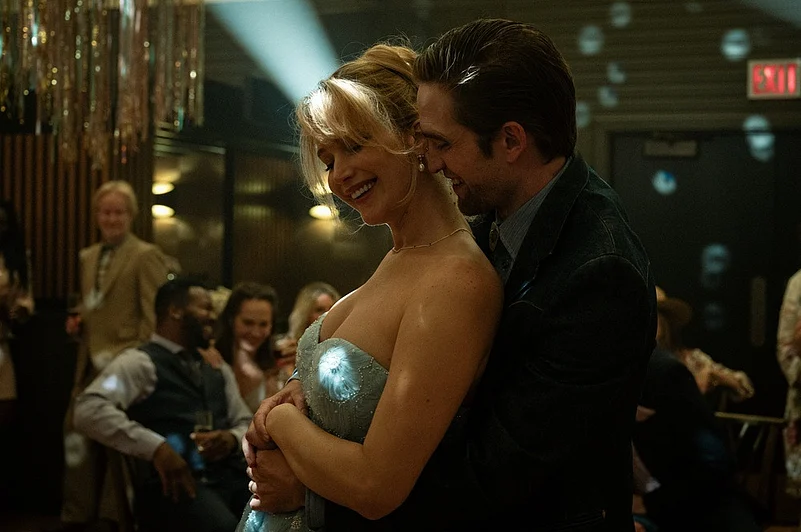
In the past horror films, mothers have often been portrayed as monsters. Few recent ones, like yours and If I Had Legs, I’d Kick You, it shifts to motherhood. Did you reflect on the past cinematic iterations?
Sometimes you don’t know how much of what Grace experiences is real and what’s purely in her head. She’s like a feral animal. She’s very unapologetic about how she is. She’s not asking for sympathy. She’s bold and fierce, a modern character. She says things that are completely inappropriate. I wanted to make it funny but that’s the truth.

She loves her son but feels constrained within domesticity. She struggles to regain her self-esteem. How was it to create a character so profound and captivating alongside Jennifer Lawrence?
Jennifer was quite no-holds-barred. You never knew where she could go with Grace. There was a great scene where she’s bored in the kitchen and the baby’s asleep. I told her to walk up to the window. She was totally free with the character. It was the same with Joaquin Phoenix (on You Were Never Really Here). Jennifer and I spoke a lot in prep. Once we landed at the house, I wanted Jennifer and Robert to freely move in and around the house.
Do you adjust the way you work with actors? Is it different with every project?
I wanted to take overperformance out of it. But I threw surprises in. There was a domestic scene but the light was going and we were losing time. Then I made the actors convert it to a wordless prowl on the grass. They trusted me deeply.
The actors signed up without reading the script…
I think it’s great when actor have that playground where everything isn’t so constrained. Jennifer did read the script. You’ve got to have something to shoot off, but also be able to experiment in the present. That location is a particular thing. You cannot be so tied to the material.
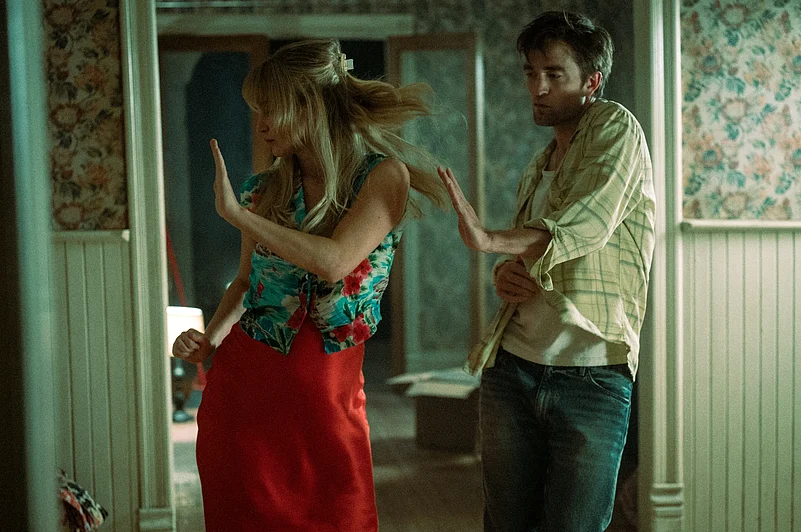
The novel takes place in France and you translate it to a kind of no man’s land in America. Everything is a bit out of place and time. Was it always looking at that place or you thought of different scenarios?
It was originally an Argentinian woman in France. I didn’t envisage setting the film in France, but I started to think about isolation in general. If you move from New York to Montana, where Grace has never been, it’s a foreign country anyway. This space is also more familiar to me.
The house feels like a creature in itself constantly watching the couple…
Well, I was initially starting outside the house. But I found this location. The house had many layers. It had three rooms looking out into the woods, two doors. I thought it far less conventional to set the camera inside the house. So, the house disintegrates as does the marriage.
You said earlier Grace isn’t interested in having your sympathy, but how did you make sure the viewer stays with Grace?
I tried to put in humor. Sometimes you hate her but you sense her honesty. I wanted to make it complex, even if you aren’t with her all the time. So allegiances also change.
The various tracks in the film tell us a lot about the characters as we go along. Choosing the songs must have been a very precise process…
I worked closely with the guitarist George Vjestica. I started thinking about the music quite early on in the scripting itself.
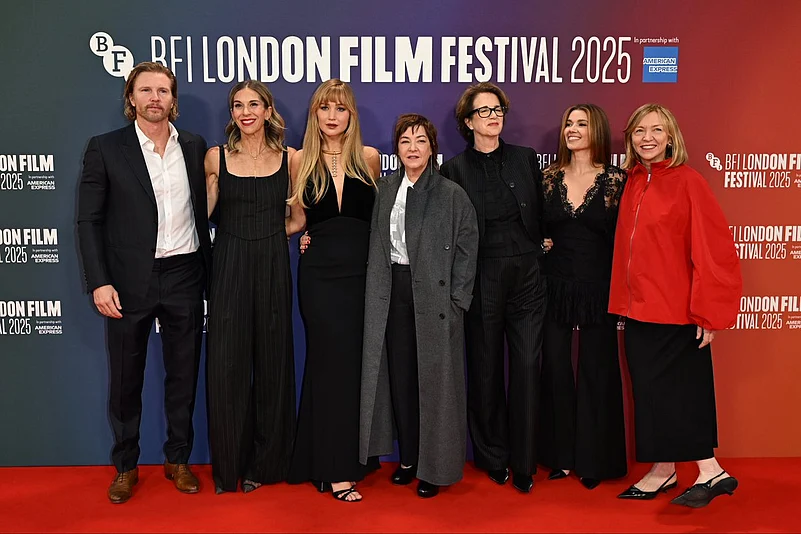
What was your focus? How did you see them before they moved to the house?
I thought they lived in a small apartment in New York. Maybe he was in a band and it wasn’t successful. They are a young couple and getting a free inherited house is a nice deal.
Do you think she was happy to move there?
The couple did have love for each other. The relationship between Grace and Pam (Sissy Spacek) is interesting because her mother-in-law probably sees her more clearly than her husband does. There is some hope. There’s a nice scene where you sense Grace understands Jackson’s father better than others. They’re like children together for a moment. So it’s fun to play with what Grace and Pam notice in an illness-inflected space.
What led you to choose Robert Pattinson, who’s the outlier English actor here?
He’s played a lot of American roles very well and has a great accent. I saw he and Jennifer had great chemistry. I got them to do a couple of dancing lessons and shot some intimate scenes quite early on. That eased the tension.

How do you see the film in the future reflect for women and mothers?
It should work as a piece of cinema. Interpretations so far from women have been interesting, like they can relate to the acceleration of feelings, marriages shifting with motherhood. The lack of sex, the idea that she’s not being craved anymore also fuels Grace’s animalistic instincts. She’s a fearless character and you hope people will run with that.







